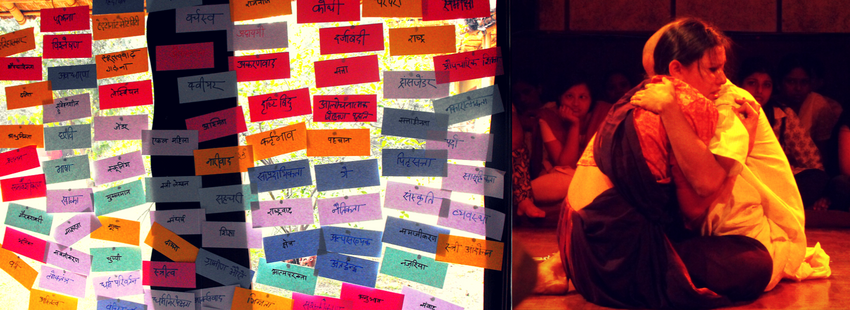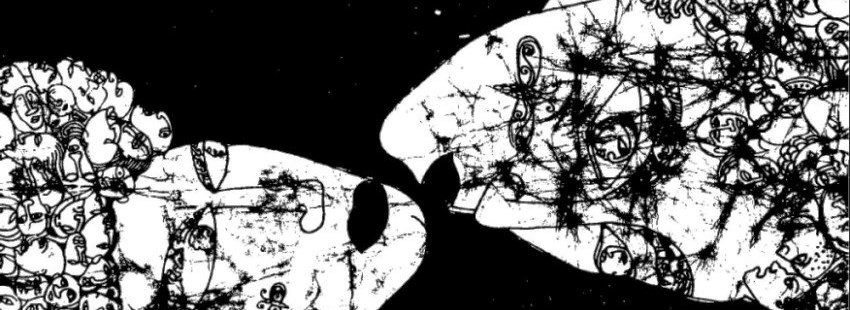Sexuality and Gender
We believe that to critically understand and address lived realities, one needs an in-depth understanding of Gender and Sexuality. As a resource organisation, Nirantar conducts training and workshops on gender and sexuality and their intersections with caste, religion and dis/ability, for NGOs, government programmes and other agencies and organisations. We have a positive and political approach towards sexuality, enabling us to acknowledge desire and pleasure, while engaging with structural issues.
Gender Based Violence (GBV) and Sexuality
In 2014, Nirantar developed a report, titled ‘Gender Based Violence and Sexuality–The Elephant in the Room’, recognizing the linkages between sexuality and GBV – underlining the importance of acknowledging sexuality as a cause for violence as opposed to only looking at it as a form of violence. These linkages have been identified during the course of our capacity building work with organisations involved in case-based interventions to address instances of GBV across four states in India (Andhra Pradesh, Bihar, Assam, and Uttar Pradesh).
Gender-based Violence and Sexuality-The Elephant in the Room
Some of its key findings include that many people are subjected to violence based on their sexuality (including sexual and gender identity), violence against women (VAW) interventions are ill-equipped to deal with sexual differences/conflict, and caseworkers unable to deal with cases of bigamy and the conflicting interests that this entails. The report also talk about how employing a sexuality perspective helps distinguish cases of consent from coercion, particularly in conflict situations where the so-called honour of the family is considered to be at stake.
Nirantar has developed tools to examine the nature of cases of VAW handled by partner organisations, to understand the existing attitudes of case workers towards survivors of violence and working with them to develop greater sensitivity and empathy while engaging with survivors.
Nirantar has also been engaging with grassroots organisations and state/national policy makers working on VAW, women's rights, and to address the current exclusion of marginalised sexualities, including lesbian and bisexual women, trans persons, and sex workers.
-
Policy Brief: This policy brief, in partnership with Institute of Development Studies (IDS), is designed to better inform policies and interventions for addressing gendered forms of violence by exploring the linkages between GBV and sexuality.
Read Policy Brief here -
Pamphlet on Addressing GBV: Nirantar has also designed an informative and interactive pamphlet to underline the linkages of sexuality and GBV as per the findings in the policy brief with IDS.
To recieve a copy of the GBV and Sexuality Pamphlet, contact us here - Practice Paper: This Practice Paper, in collaboration with IDS, talks about the significance of issues of sexuality as they relate to rural women’s lives and how community-based programmes can be enabled to address these issues. Click here to read ‘Bringing Together Pleasure and Politics: Sexuality Workshops in Rural India’
A Critical Examination of Sexuality Discourses in India
Our report titled ‘A Critical Examination of Sexuality Discourses in India’ aims for a “coming together” of various conversations around sexuality in India towards a positive, political integration. Spanning from marginalisation of gender and sexual identities to broader links of sexuality and gender transgression with social, economic and political structures around caste, religion and class, and ways in which all these interact with law, education and health, the mapping brings together some critical insights and questions. This report draws on conversations about sexuality among activists and development practitioners based on a series of semi-structured interviews conducted in 2013-2014 and presents findings backed by rich anecdotal evidence that help us examine our understanding of sexuality through varied lenses.
A Critical Examination of Sexuality Discourses in India
Summary Report: A Critical Examination of Sexuality Discourses in India
The key thematic areas that emerged from the mapping exercise were carried forward through discussions in Nirantar’s ‘National Consultation: A Critical Examination of Sexuality Discourses in India’. These findings talked about location of ‘Centre and Margins’ in sexuality spaces, analysing identity politics from a sexuality perspective, intersections of Caste, Class and Religion with Sexuality, Marriage as an institution, and understanding the tensions and possibilities between movements.
Sexuality and Education
Nirantar is working towards ensuring that education can be empowering for young people. This work assumes importance in a context in which approaches to adolescence education and life skills, particularly those of State-sponsored agencies, are often fear-based, didactic and out of sync with the lived realities of adolescents. Nirantar sees the need for such educational work with adolescents to be transformatory, positive and empowering.
We believe that sexuality education is a right that young people cannot be denied. Sexuality is a part of all our lives. If education is about critically understanding our lived realities, then sexuality necessarily has to be a part of education.
- Contribution in Life Skills Education: Nirantar was intensively involved in the process of revising the Adolescence Education Programme (AEP) as outlined by NCERT. This engagement involved participation in consultations, a series of working committee meetings, and drafting sections (‘Process of Growing up’) of the training materials for the “Adolescence Education Programme – Training and Resource Materials” NCERT, September 2010. The revised approach and materials have addressed several problems with the earlier AEP material published in 1999, which tended to view adolescence in a negative light, focussing entirely on problems, dangers and disease, although there is still need for further strengthening. The process involved a number of other players, including other civil society groups working on issues of gender and sexuality as well as UNFPA.
- Developing a Module on Sexuality for IGNOU: We have developed a unit titled ‘Constructing Sexuality: Issues’ for the Queer Liberation module in the PG Diploma/MA programme of Women’s and Gender Studies offered by IGNOU. The unit explained the linkages between sexuality as a social construct, structures of powers, privilege and punishment, not only through theoretical work but also through life stories and fictional accounts to establish it as a personal yet political concept.
- Sexuality Education for Young People: This document is a review of existing approaches and material related to adolescence/life skills and offers arguments for the need for sexuality education that is neither instrumentalist, nor moralistic. Based on inputs from women’s groups, child rights groups, sexual rights groups and educationists, it articulates what is required to ensure that sexuality education constitutes an empowering learning opportunity for adolescents. This book also draws upon presentations and discussions held during the National Consultation on Sexuality Education for Young People organised by Nirantar in December 2007, New Delhi.
Training and Capacity Building
- Institutional Courses: Nirantar organises annual workshops and trainings on gender and sexuality and also organise workshops and trainings for different organisations as per request. Our flagship training programme is the Course on Young People, Sexuality and Rights (Yuva, Yaunikta and Adhikar). Check out more details about this course and other trainings offered by Nirantar
- Training Modules: Over the course of our trainings and workshops, Nirantar has also developed modules and resource material to help trainers on themes of gender and sexuality.
- Gender Aadharit Hinsa Aur Yaunikta Par Module (Gender Based Violence and Sexuality Module) is three-day training module with several activities and it incorporates probable challenging responses from participants with points for the trainer to keep in mind during a training.
- Khulti Parten: Yaunikta aur Hum (Vol. 1 & 2) is resource book in two parts, aimed at explaining key concepts of sexuality in an in-depth manner, yet accessible to community-based practitioners, and that relates to our lives and work at the community level. It is informed by an approach to sexuality which is positive and political.


